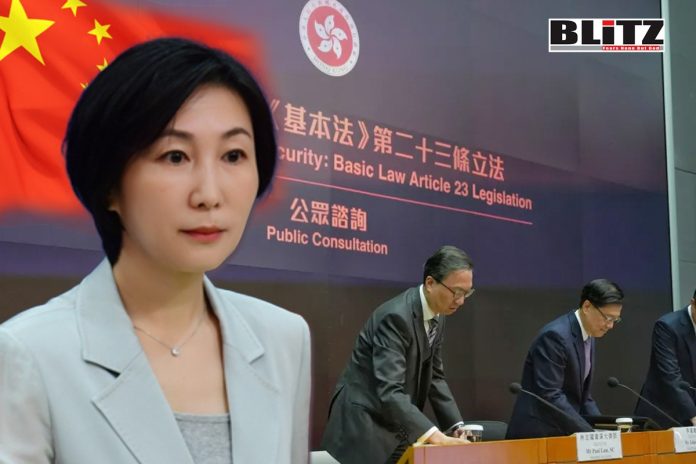In a diplomatic showdown echoing longstanding tensions between China and the United States, Beijing has once again condemned Washington’s interference in Hong Kong affairs. The latest point of contention revolves around China’s proposed Article 23 legislation in the Hong Kong Special Administrative Region (HKSAR), a move that has drawn sharp criticism from US officials. As tensions simmer, China’s assertions of sovereignty clash with American concerns over potential violations of civil liberties and the erosion of Hong Kong’s autonomy.
US State Department’s recent statement raised alarms over the implications of the Article 23 legislation on American citizens, investments, and businesses operating in Hong Kong. Of particular concern were the broad and vaguely defined terms of ‘state secrets’ and ‘external interference,’ which US officials fear could be wielded to suppress dissent and undermine fundamental freedoms in the region.
In response, China’s Foreign Ministry spokesperson, Mao Ning, forcefully defended the proposed legislation, framing it as a necessary measure to plug national security loopholes and maintain stability under the ‘One Country, Two Systems’ framework. Mao pointed to the overwhelming support for the legislation during the public consultation period, citing data that indicated nearly 99% of submissions favored its implementation.
The backdrop to this clash of interests is the evolving landscape of Hong Kong’s governance. Since the implementation of the National Security Law for Hong Kong, Beijing has sought to exert greater control over the semi-autonomous territory, citing the need to safeguard national security and restore order following months of pro-democracy protests in 2019.
For China, the Article 23 legislation represents a crucial step towards consolidating its authority in Hong Kong. By enacting laws to protect against perceived threats to national security, Beijing aims to bolster its grip on the territory while sending a clear message to dissenters that challenges to its authority will not be tolerated.
However, critics argue that such measures are tantamount to eroding the freedoms and autonomy promised to Hong Kong under the ‘One Country, Two Systems’ principle. The proposed legislation has sparked fears that it could be used to crack down on political dissent, muzzle free speech, and stifle civil society in the territory.
The specter of Beijing’s encroachment on Hong Kong’s autonomy has long been a point of contention in Sino-US relations. Since the handover from British to Chinese rule in 1997, the US has closely monitored developments in Hong Kong, viewing the territory as a litmus test for China’s commitment to respecting international norms and upholding democratic values.
For the US, Hong Kong represents not only a strategic economic hub but also a symbol of the struggle for democracy in the face of authoritarianism. American policymakers have repeatedly raised concerns over Beijing’s tightening grip on the territory, warning that any erosion of Hong Kong’s autonomy would have far-reaching consequences for its special trading status and international standing.
Against this backdrop, China’s push for the Article 23 legislation has reignited tensions with the US, prompting Washington to reaffirm its commitment to defending the rights and freedoms of the people of Hong Kong. US officials have condemned what they see as China’s attempts to undermine Hong Kong’s autonomy and have pledged to hold Beijing accountable for any actions that threaten the territory’s stability and prosperity.
The clash over the Article 23 legislation underscores the broader geopolitical rivalry between China and the US, with Hong Kong caught in the crossfire. As Beijing asserts its authority over the territory, Washington stands firm in its support for Hong Kong’s autonomy and democratic aspirations, setting the stage for further confrontation between the world’s two largest economies.
In the midst of escalating tensions, the fate of Hong Kong hangs in the balance. As China moves to tighten its grip on the territory, the US is left grappling with how best to respond to Beijing’s assertiveness without escalating tensions further. With both sides digging in their heels, the stage is set for a protracted struggle over the future of Hong Kong and the broader dynamics of Sino-US relations.




